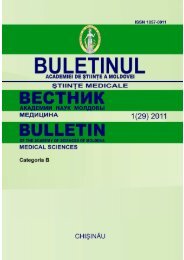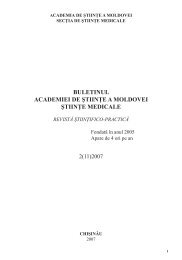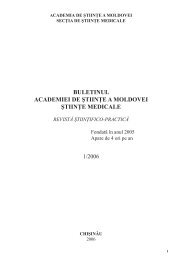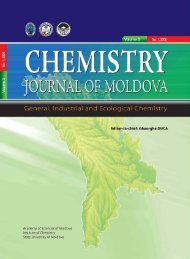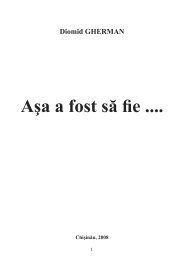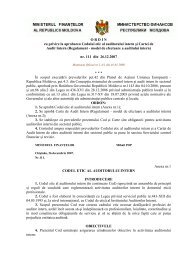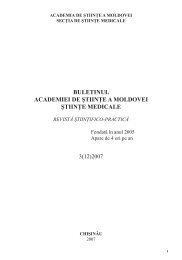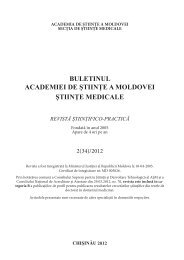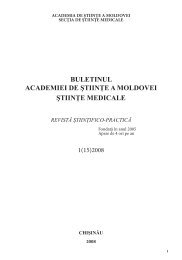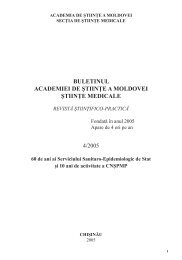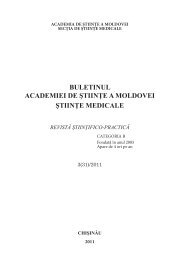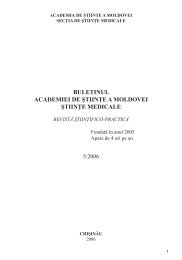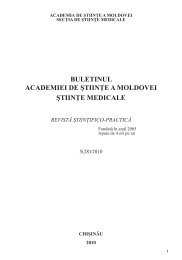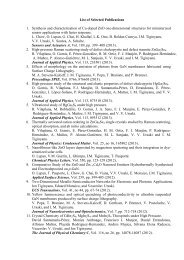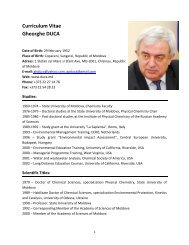2011, nr. 1 - Academia de Ştiinţe a Moldovei
2011, nr. 1 - Academia de Ştiinţe a Moldovei
2011, nr. 1 - Academia de Ştiinţe a Moldovei
Create successful ePaper yourself
Turn your PDF publications into a flip-book with our unique Google optimized e-Paper software.
248<br />
nifestărilor clinice ale urmărilor acci<strong>de</strong>ntului vascular<br />
cerebral.<br />
Bibliografi e<br />
1. Krishnan K.R.R. MRI <strong>de</strong>fi ned vascular <strong>de</strong>pression.<br />
Am. J. Psychiatry,1997; 154:497–501.<br />
2. R.G. Robinson, K.I. Kubos, L.B. Starr, K. Rao, T.R.<br />
Price. Mood disor<strong>de</strong>rs in stroke patients: importance of location<br />
of lesion. Brain, 1984; 107: 81–93.<br />
3. P.L. Morris, R.G. Robinson, B. Raphael, M.J. Hopwood.<br />
Lesion and post-stroke <strong>de</strong>pression. J. Neuropsyc.<br />
Clin. Neurosc, 1996; vol. 8, № 4:399–403.<br />
4. Beck A.T. An inventory for measuring <strong>de</strong>pression.<br />
Arch. General. Psychiat, 1961; 4:561–585.<br />
5. Folstein M.F. Mood disor<strong>de</strong>rs as a specifi c complication<br />
of stroke J. Neurol. Neurosurg. Psychiatr., 1977; vol. 40,<br />
№ 10:1018–1020.<br />
6. Kikumoto, O. Clinical study of <strong>de</strong>pressive state following<br />
stroke. Seishin. Shin. Keigaku Zasshi.,1990; vol. 92,<br />
№ 7: 411–434.<br />
7. Chemirenski E., Robinson R.G. Th e neuropsychiatri<br />
of stroke. Psychosomatic. 2000; vol. 41, № 1:5–14.<br />
8. Брагина Н.Н., Доброхотова Т.А. Функциональные<br />
асимметрии человека. Москва, Медицина, 1988; 240 с.<br />
9. Международная классификация болезней<br />
(10-й пересмотр). Классификация психических и<br />
поведенческих расстройств. ВОЗ. Россия, СПб.:<br />
Оверлайд, 1994; с. 61–68, 111–130.<br />
Rezumat<br />
Au fost examinaţi 47 <strong>de</strong> pacienţi cu afecţiunea emisferei<br />
stângi și 30 – cu afectarea emisferei drepte. Principalul<br />
simptom la toţi pacienţii este hipotimia (observată în 99<br />
% cazuri). Simptome <strong>de</strong>se ale <strong>de</strong>presiei în toate localizările<br />
atacului vascular cerebral sunt: oboseala pronunţată<br />
(93%), capacitatea redusă <strong>de</strong> concentrare a atenţiei (91%).<br />
Diferenţe veridice în prezenţa acuzelor date la bolnavi în<br />
funcţie <strong>de</strong> localizarea afecţiunii nu sunt. Așa simptome ale<br />
Buletinul AŞM<br />
<strong>de</strong>presiei ca pier<strong>de</strong>rea <strong>de</strong> interese și capacităţi, i<strong>de</strong>ile <strong>de</strong> vinovăţie,<br />
poft a <strong>de</strong> mâncare scăzută au fost observate mai <strong>de</strong>s<br />
la bolnavii cu afectarea emisferei stângi.Tulburări <strong>de</strong> somn<br />
au fost observate în 84% cazuri, cel mai <strong>de</strong>s la afectarea<br />
emisferei drepte.<br />
Summary<br />
Survey totally 47 patients post-stroke with lesions of<br />
the left hemisphere of the brain and 30 patients with lesions<br />
of the right hemisphere of the brain. Leading symptom,<br />
which have all patients is hypothymia (99%). Common<br />
symptoms of <strong>de</strong>pression for all localizations of stroke<br />
are: fatigability (93%), <strong>de</strong>creased ability to focus attention<br />
(91%). Signifi cant diff erences <strong>de</strong>pending on the location of<br />
the lesion in the frequency of complaints of patients is not.<br />
Such symptoms of <strong>de</strong>pression as loss of interest and ability<br />
to enjoy the i<strong>de</strong>as of guilt, <strong>de</strong>creased appetite, oft en seen<br />
in patients with lesions of the left hemisphere. Disturbed<br />
sleep was observed in 84% of cases, most oft en <strong>de</strong>tected in<br />
lesions of the right hemisphere.<br />
Резюме<br />
Было обследованно 47 пациентов, перенесших<br />
острое нарушение мозгового кровообращения с поражением<br />
левого полушария, и 30 пациентов с поражением<br />
правого полушария. Ведущим симптомом у<br />
всех пациентов является гипотимия (99% случаев). Частыми<br />
симптомами депрессии при всех локализациях<br />
инсульта являлись: выраженная утомляемость (93%),<br />
сниженная способность к сосредоточению внимания<br />
(91%). Достоверных различий в частоте этих жалоб<br />
у больных в зависимости от локализации поражения<br />
нет. Такие симптомы депрессии, как утрата интересов<br />
и способности получать удовольствие, идеи виновности,<br />
сниженный аппетит, чаще наблюдались у пациентов<br />
с поражением левого полушария. Нарушения сна<br />
наблюдались в 84% случаев, чаще выявлялись при поражении<br />
правого полушария.



